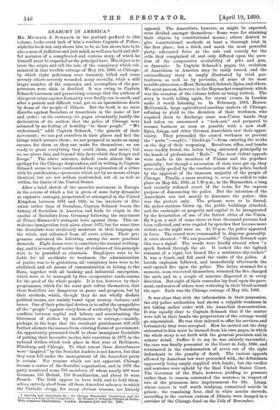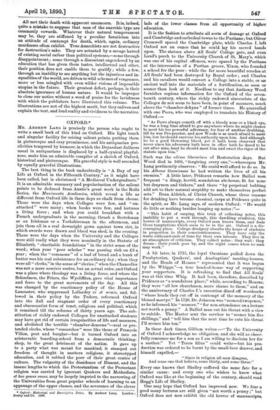ANARCHY IN AMERICA.*
MR. MICHAEL J. SCHAACK, in the portrait prefixed to this volume, looks every inch of him a resolute Captain of Police; while his book not only shows him to be so, but shows him to be also a man of judicious and just mind, as well as a lucid and skil- ful narrator of a complicated and curious story, of which he himself must be regarded as the principal hero. His object is to trace the origin and tell the tale of the conspiracy which cul- minated in that terrible outrage of May 4th, 1886, at Chicago, by which eight policemen were instantly killed and some seventy others severely wounded, many mortally, while a still larger number of the comrades and accomplices of the per- petrators were slain or disabled. It was owing to Captain Schaack's acumen and persevering courage that the authors of this great crime against humanity were flnally run to earth, and after a patient and difficult trial, put to an ignominious death by doom of the people of Illinois. But the book is no mere diatribe against Socialists or Anarchists in the name of law and order; on the contrary, its pages abundantly justify the declaration of its author, that the police of Chicago were actuated by no feeling of hostility "to these people." "We understand," adds Captain Schaack, "the genesis of their movement ; we can put ourselves in their places and feel the things which actuate them ; we are prepared to make as many excuses for them as they can make for themselves ; we are ready to grant everything they could claim, and more; but we see above this, and beyond this, facts which they forget and forego." The above sentence, indeed, reads almost like an apology for the Chicago desperadoes, and in writing it, Captain Schaack seems to have confounded the explanation of a crime with its justification,—processes which are by no means always identical, but are not seldom confounded, out of, as well as within, the limits of the United States.
After a brief sketch of the anarchic movement in Europe, in the course of which a list is given of some forty dynamite or explosive outrages, perpetrated or attempted in the United Kingdom between 1881 and 1885, in the interests of Dis- union rather than of Socialism, Captain Schaack traces the history of Socialism in America, and finds its origin in the exodus of Socialists from Germany following the enactment of Prince Bismarck's stringent laws against them. This un- welcome immigration took place about 1873, but for some time the Socialists were studiously moderate in their language on the whole, and refrained from all overt action. Their pro- gramme embraced the following, among the more practical demands. Eight hours were to constitute the normal working- day, and it is worthy of notice that all violators of this principle were to be punished as criminals. Employers were to be liable for all accidents to workmen, the administration of justice was to be gratuitous, all conspiracy laws were to be abolished, and all means of communication to belong to the State, together with all banking and industrial enterprises, which were to be managed by free co-operative trade-unions for the good of the whole people. It is not, however, by their programmes, which for the most part refute themselves, that these Socialists are dangerous to peace and progress, but by their methods, which, though they do not wholly disdain political means, are mainly based upon secrecy, violence, and terror. One of their principal devices is to enlist the sympathies of the " people " against every form of authority, by fomenting conflicts between capital and labour, and accentuating the bitterness of strikes by incitements to outrage,—mainly, perhaps, in the hope that the resultant punishment will still further alienate the masses from existing forms of government. An opportunity presented itself to these immigrant Socialists of putting their favourite tactics into execution in 1877, in the railroad strikes which took place in that year at Baltimore, Pittsburg, and Chicago. To what extent these disturbances were " inspired" by the Socialist leaders is not known, but that they soon fell under the management of the Anarchist party is certain. For reasons which are not apparent, Chicago became a centre of the Socialist organisation, and in 1878 the party numbered some 750 members, of whom nearly 400 were Germans, 150 British, 150 Scandinavian, and about 50 were French. The Irish appear to have held, and to hold them- selves, entirely aloof from all these Anarchist schemes, to which the Catholic clergy, for many obvious reasons, are bitterly
• Anarchy and Anarchists, &a. the Chicago Haymarket Conspiracy, and the Detection and Trial of the Conspirators. By Michael J. Schmuck, Captain of Police. With numerous Illustrations. London: Sampson Low and Co. 1890. opposed. The Anarchists, however, as might be expected, were divided amongst themselves.• Some were for attaining their objects by constitutional means ; others desired to give constitutional methods at least a thorough trial in the first place ; but a third, and much the most powerful party, advocated force as the sole real remedy for the evils they complained of, and only differed upon the ques- tion of the comparative availability of pike and gun, or dynamite. In Captain Schaack's pages, the evolution of Anarchism in America may be easily traced, and the extraordinary story is amply illustrated by vivid por- traitures, as well as by portraits, of some of its most notable advocates,—Most, Reinsdorf, Schwab, Spies, and others. We must pass on, however, to the Haymarket conspiracy, which was the occasion of the volume before us being written. The story is worth telling again, for recent events in London make it worth listening to. In February, 1886, Messrs. McCormick, large agricultural-machine makers of Chicago, refusing to yield to the dictation of their workmen, who required them to discharge some non-Union hands they had taken on, announced a "lock-out," and prepared to resume business as soon as possible with a new staff. Spies, Lingg, and other German Anarchists saw their oppor- tunity. They persuaded the ousted workmen to prevent the "scabs "—anglic4, "blacklegs "—from entering the works on the day of their reopening. Revolvers, rifles, and bombs were readily found, the latter being entrusted principally to the hands of professional "Reds." The most violent appeals were made to the members of -Unions and the populace generally; but though a succession of riots were got up, they were easily quelled by the resolute action of the police, backed by the approval of the immense majority of the people of Chicago. Finally, a mass meeting in arms was called to take place on May 4th, 1886, at 7.30 p.m., in the Haymarket, a long and recently widened street of the town, for the express purpose of denouncing the police. But the intention of the Anarchists was not merely to denounce the police : this was the pretext only. The prisons were to be forced, the police-stations blown up, the public buildings attacked, and the onslaught on property and capital to be inaugurated by the devastation of one of the fairest cities of the Union. By 8 p.m. a mob of some three or four thousand persons had been collected, and were regaled by speeches that became more violent as the night wore on. At 10 p.m. the police appeared in force. The crowd were commanded to disperse peaceably. A voice shouted : "We are peaceable." Captain Schaack says this was a signal. The words were hardly uttered when "a spark flashed through the air. It looked like the lighted remnant of a cigar, but hissed like a miniature sky-rocket." It was a bomb, and fell amid the ranks of the police. A terrific explosion followed, and immediately afterwards the mob opened fire upon the police. The latter, stunned for a moment, soon recovered themselves, returned the fire, charged the mob, and in a couple of minutes dispersed it in every direction. But eight of their comrades lay dead upon the pave- ment, and scores of others were weltering in their blood around the spot. Such was the Chicago outrage of May 4th, 1886.
It was clear that with the information in their possession, the city police authorities had shown a culpable weakness in not taking earlier order with the Anarchist demonstration. It was equally clear to Captain Schaack that if the matter were left in their hands, the perpetrators of the outrage would go unpunished. He was thus induced to offer his services, and fortunately they were accepted. How he carried out the duty entrusted to him must be learned from his own pages, in which the whole story is set forth with the greatest precision and in minute detail. Suffice it to say he was entirely successful; the case was finally presented to the Court in July, 1886, and terminated in the condemnation of seven out of the eight defendants to the penalty of death. The various appeals allowed by American law were proceeded with, the defendants apparently being amply supplied with funds ; but the verdict and sentence were upheld by the final United States Court. The Governor of the State, however, yielding to pressure rather than to reason, commuted the sentence, in respect of two of the prisoners, into imprisonment for life. Lingg, whose career is well worth studying, committed suicide in prison ; the remaining four, clad in white muslin shrouds, according to the curious custom of Illinois, were hanged in a corridor of the Chicago Gaol on the 11th of November. All met their death with apparent unconcern. It is, indeed, quite a mistake to suppose that men of the anarchic type are commonly cowards. Whatever their natural temperament may be, they are stiffened by a peculiar fanaticism into an attitude of contempt for death, which, again, ordinary murderers often exhibit. True Anarchists are not destructive for destruction's sake. They are actuated by a savage hatred of existing social rather than political systems,—some through disappointment ; some through a discontent engendered by an education that has given them tastes, intellectual and other, their position does not enable them to gratify ; while a few, through an inability to see anything but the injustices and in- equalities of the world, are driven to wild schemes of vengeance, more or less mingled with even wilder visions of impossible utopias in the future. Their greatest defect, perhaps, is their absolute ignorance of human nature. It would be improper to close our notice without a word of praise for the lavishness with which the publishers have illustrated this volume. The illustrations are not of the highest merit, but they enliven and explain the text, and lend reality and vividness to the narrative.



















































 Previous page
Previous page